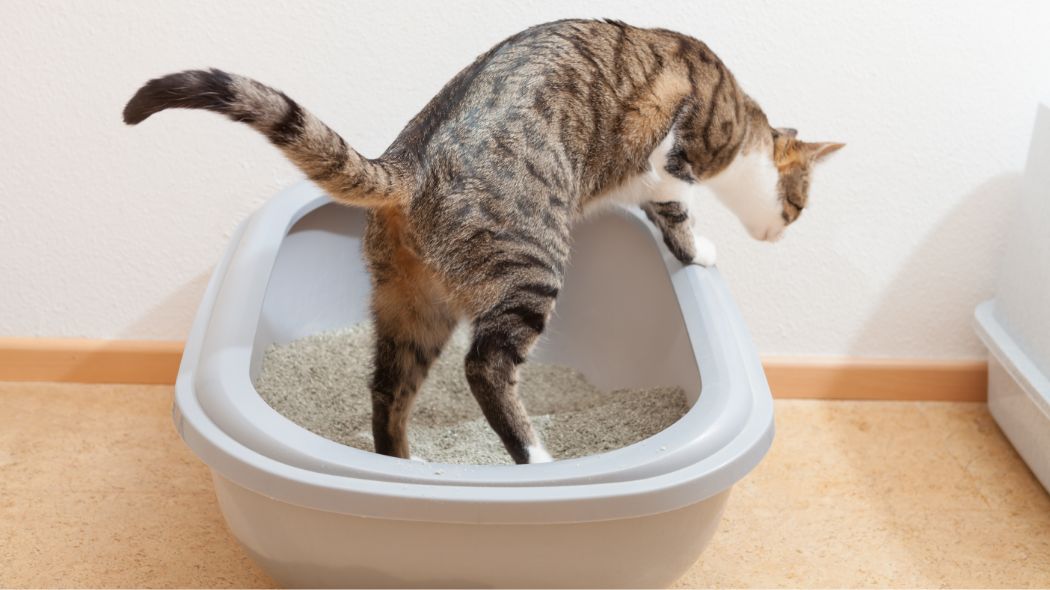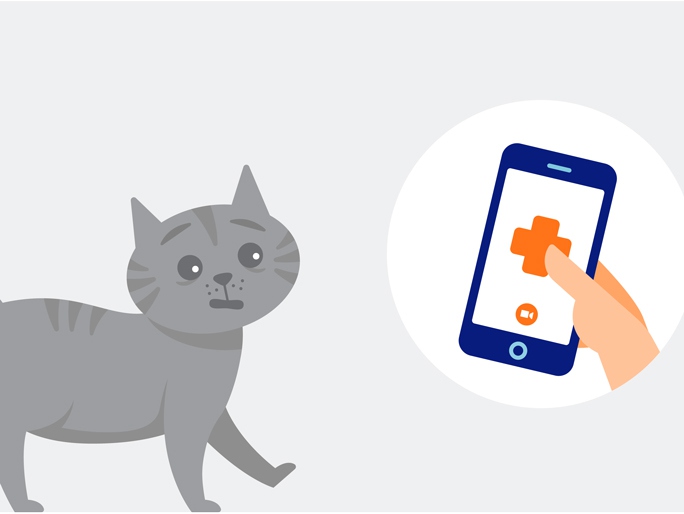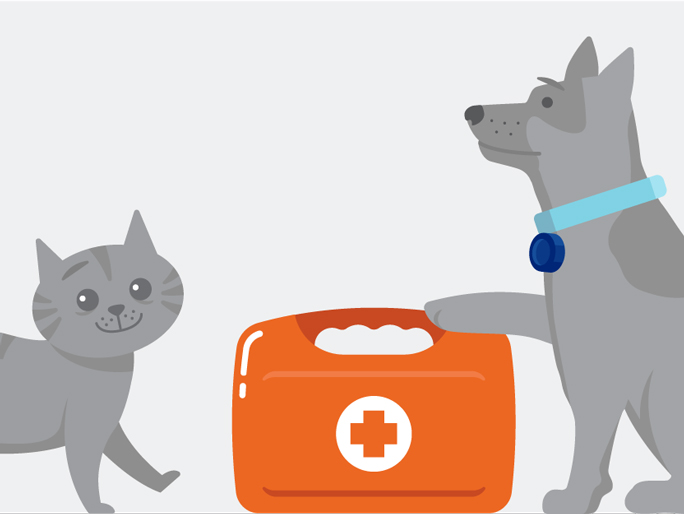single-celled parasites in dogs and cats
Does your dog or cat have bloody diarrhea? Watery diarrhea? Fever and lethargy? Single-celled parasites like coccidia or Giardia may be to blame.
Gastrointestinal parasites include tiny, single-celled organisms that can lurk in food, water, and environments. The primary symptoms of these “stomach bugs” are fever, vomiting, and diarrhea, so if your pet or anyone in your home has these symptoms, please see your vet and consider discussing them with your own doctor.
Common single-celled parasites in pets
- Coccidia
- Giardia
- Toxoplasma gondii

Symptoms of stomach bugs from coccidia and Giardia in pets
- Watery or bloody diarrhea
- Vomiting
- Lethargy
- Weight loss
- Dehydration
- Fever

Treating single-celled organisms in pets
- Consult your veterinary team.
- Use prescription medications as directed.
- Help avoid dehydration.

Help prevent coccidia, Giardia, and toxoplasmosis in people and pets
- Consult your veterinarian and human doctor.
- Avoid unclean food and water (and take caution around natural water and food sources).
- Use good personal hygiene around raw food and animal waste.
- Carefully clean and disinfect kitty litter boxes.
Diarrhea and single-celled internal parasites in pets
Both pets and people risk getting infected with single-celled parasites from contaminated water, soil, food, or environments. Dehydration from vomiting and diarrhea can be a health risk for pets, so please see your veterinarian about clinical signs like digestive upset and fever.

Coccidia and coccidiosis in pets
Coccidia is a single-celled parasite that causes a digestive tract disease called coccidiosis in both people and pets. Young, small, and health-compromised pets are especially at risk for life-threatening dehydration from bloody diarrhea.
How pets catch coccidia
Coccidia spreads by contact with contagious spores called oocysts, which are spread through contact with contaminated poop or by eating contaminated prey. Pets without symptoms can still spread these cysts in their poo.
Once inside a host, coccidia oocytes lodge in cells in the intestinal wall to continue into the next stage of their life cycle. When ready, they burst through the cell, releasing more parasites into neighboring cells and, if the infection is widespread enough, causing telltale signs like bloody diarrhea.
Coccidia treatment and prevention
Your veterinarian will diagnose coccidia based on your pet’s medical history, symptoms (like fever, bloody diarrhea, and other physical signs), and the type of oocysts present in their stool sample.
Coccidiosis is treated with prescription medications. Very sick pets may also need help with secondary issues like blood loss and dehydration.
Can you catch coccidia from your pet?
No, you can’t catch coccidia from your dog or cat, but you can catch it from the same water source where they got it — or a new one they infest closer to home.
Giardia and giardiasis in pets
Giardia is a species of contagious single-celled parasites that typically passes to pets and people through drinking contaminated water. Even a few drops can spread the bug.
How cats and dogs get Giardia
Giardia is spread through water, soil, and surfaces that have been contaminated with the tiny parasite. Giardia is extremely resistant to both heat and cold and needs special sanitation to help control it in the environment.
Pets can look perfectly healthy and still spread Giardia to other pets in their poop. Be aware that dog parks, multi-cat potty areas, and standing water can all be contaminated by the parasite.
Younger pets with immature immune defenses as well as pets with weakened immune systems are at special risk for developing severe giardiasis.
Giardia treatment and prevention
The main symptom of Giardia in pets is digestive upset that can lead to life-threatening dehydration. See your vet if your pet has active vomiting or diarrhea for more than a few hours, and seek immediate veterinary emergency care if your pet’s eyes are sunken and their gums are dry or tacky.
It can help to bring a fresh stool sample in a clean container when you bring your pet to the vet (don’t worry if it’s gross — we’ve seen it all). A sample can help us make a diagnosis and set up a treatment plan for your pet.
Pets often need more than one course of treatment to kick the bug. Your vet will also give you recommendations on how to clean and disinfect any potentially contaminated areas and items to avoid spreading the disease, including kennels, dog runs, toys, food and water bowls, and fabrics.
Because people can catch Giardia, always be extremely careful about washing your hands after touching your pet and their poop, toys, and living environments. Please follow all veterinary instructions until your pet is given the all-clear.
Is Giardia contagious? Can you catch Giardia from your pet?
Giardia is contagious and you can catch it from your pet. While there’s more than one kind of it, and different bugs seem to prefer different kinds of hosts, it’s far better to avoid the problem entirely.
Always practice good hygiene around food, water, and your pet.
- Keep your pet’s home, food dish, water bowls, and potty areas clean.
- Disinfect household surfaces and bedding.
- Always wash your hands after touching pets, pet food, pet poop, and pet toys.
- Do not allow pets to drink from streams, creeks, or lakes.
Toxoplasmosis and Toxoplasma gondii in cats
Toxoplasmosis is a disease spread by a very common single-celled parasite, Toxoplasma gondii (T. gondii), that thrives in everything from raw meat to kitty litter boxes.
A cat infected by T. gondii may show no symptoms at all but still shed contagious eggs, called oocytes, in their poop. Humans can help avoid catching the disease by thoroughly washing their hands after touching cats, cat poop, or litter.
How cats catch T. gondii
T. gondii has a complicated life cycle. Depending on its host, the organism can either reproduce and shed new eggs (oocytes), clone itself in small cysts, or enter two different kinds of dormant stages that help it spread.
Cats are considered T. gondii’s “definitive” hosts. Infected cats often show no sign of infection even as they shed oocytes through their poop. After a few days, these oocytes form spores that are actively contagious if ingested by other animals like rodents, livestock, and people.
Toxoplasmosis treatment and prevention
Cats with Toxoplasmosis typically only show symptoms if their immune system is undeveloped, like in kittens, or compromised, like in cats with Feline leukemia or FIV. Common symptoms include fever and lethargy.
Blood tests can help your veterinarian make a diagnosis of T. gondii, which is usually treated with a course of specific antibiotics. (A fecal test isn’t typically all that helpful, since cats only shed oocytes at certain stages in the parasite’s life cycle.)
Can you catch Toxoplasmosis from your pet?
T. gondii can pass to humans through many different vectors, including spores from infected poop in kitty litter boxes. Contagion is a special concern for immunocompromised people and pregnant women, who may pass the infection to the fetus in the womb.
Toxoplasmosis is not just spread by cat poop, and not all cat poop is infected at all times. The best way to avoid contagion is to always use good hygiene, especially when handling raw meat and kitty litter, or touching anything in any area cats use as a potty.
If you’re pregnant or immunocompromised, you can help avoid extra risk by not interacting with stray cats, not adopting a new cat during pregnancy, and asking a friend to clean out the kitty litter boxes for you.
Additional tips:
- Keep your cats indoors.
- Clean kitty litter every day to help prevent spores.
- Wear gloves while cleaning kitty litter.
- Wash your hands thoroughly in hot soap and water after touching cats, cat feces, or kitty litter.
An Optimum Wellness Plan is a smart way to prevent pests
Our Optimum Wellness Plans® are affordable yearlong packages of essential preventive care. They're designed for different needs, ages, and lifestyles, and include options to easily add parasite control for fleas, ticks, and more.
Talk to your Banfield vet to find out which package is best for your pet.
Mentioned in this article

When to call the vet
Signs your furball needs help (and if it’s urgent!).

Need advice on flea control? Ping Pet Chat™!
Whether it's 3 a.m. or 3 p.m., connect with a real veterinary professional for immediate petcare advice. It's included in all Optimum Wellness Plans®!
Log in to start chatting
Save at the Banfield Shop
Our mission is to provide high-quality prescription meds for the pet you love. We believe in safe, effective petcare, so we thoroughly assess every item we carry. We offer discounts on eligible products with your pet’s Optimum Wellness Plan. And you can easily schedule deliveries with our super convenient AutoShip program.
Banfield can help prevent and treat parasites in pets
 Regular wellness exams that include a full physical and fecal exam can help keep your furball happy and healthy. Kittens and puppies should start regular appointments when they’re about 6 weeks old, and then come in twice a year once they’re 5 months old. At your visits, we’ll check your little love from nose to tail, discuss age, needs, and lifestyle, and recommend trusted prevention medication to help fight off nasty critters that might feed on your pet.
Regular wellness exams that include a full physical and fecal exam can help keep your furball happy and healthy. Kittens and puppies should start regular appointments when they’re about 6 weeks old, and then come in twice a year once they’re 5 months old. At your visits, we’ll check your little love from nose to tail, discuss age, needs, and lifestyle, and recommend trusted prevention medication to help fight off nasty critters that might feed on your pet.
Even if your pet is on a regular preventive for fleas, ticks, worms, mange, and other bugs, please make an appointment as soon as possible if you spot potential symptoms. Sooner is always better in helping to prevent a big infestation for your furry friend.
 Mites and mange
Mites and mange Podcast - Not Just Fluff
Podcast - Not Just Fluff




